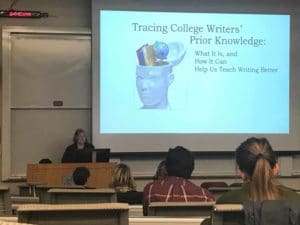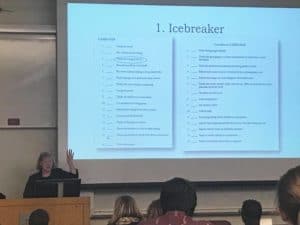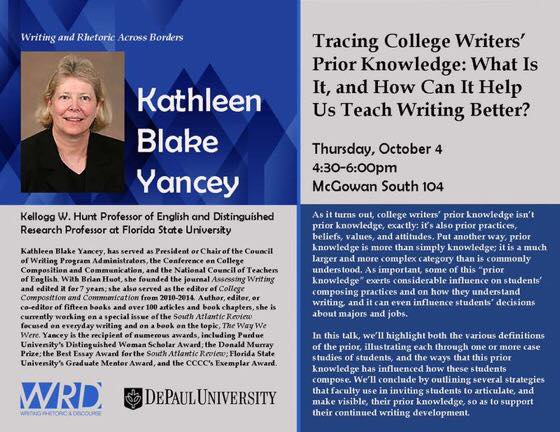Introduction
Kathy Blake Yancey joined the WRD Department as a part of its quarterly speaker series, Writing and Rhetoric Across Borders. Yancey is the Kellogg W. Hunt Professor of English and Distinguished Research Professor at Florida State University. Her presentation, “Tracing College Writers’ Prior Knowledge: What Is It, and How Can it Help Us Teach Writing Better?” highlighted why and how teachers should draw on students’ various prior knowledges about writing. As Yancey said,
“Prior knowledge does not determine what we will learn, but it seriously influences what we will learn.”

Research
Professor Yancey’s talk began with an introduction to the concept of “prior knowledge,” as outlined in How People Learn (see the chapter .pdf ). This framework outlines three opportunities educators have when it comes to the prior knowledge that students bring to their classrooms:
- If students have prior knowledge that aligns with dominant beliefs of the field, educators can build upon that prior knowledge;
- If students have prior knowledge that does not align with the dominant beliefs of the field, educators must realign that knowledge with dominant beliefs of the field;
- If students have community-based beliefs that do not align with the held beliefs of the field, these beliefs may need to be challenged for students to best engage with the material.
Yancey reviewed the research of other scholars on students’ prior knowledge and shared findings from her own study of three interns negotiating shifting expectations for their writing. One of her key findings is that many students see writing as linked to identity and personal expression and bring little prior knowledge to the classroom about writing with a specific purpose to a specific audience.
Strategies
The second part of Yancey’s presentation reviewed several best practices for teachers that align with theories of prior knowledge. The strategies that Professor Yancey presented include:
- Icebreakers that ask students to discuss their prior knowledge of writing. For example, a teacher can ask students to find one other student in the class that agrees with one statement on a prepared list, such as, “Thinks of the page as a canvas” and “Prefers the term writing to composing.”
- Three Focused Questions: this is a strategy educators can employ to get direct answers and understand the needs of students. Focused questions include:
- Describe something you liked writing and explain why you liked it.
- Describe something you did not like writing and explain why.
- Who are you as a writer; what do you do well, and what could you do better?
- Framing Writing as a Reflective Process throughout the course and across assignments. Yancey suggested that teachers can encourage reflection with questions like, “If you had one more week, what would you change about or do differently with this text?” or “How is this writing like or unlike writing you did in high school or in other classes?”
- Key Terms in the classroom can help to shape the students’ shared knowledge and provide shared language about writing, such as genre and audience. Yancey suggested asking students to write about key terms, read about them, map them, define them, and return to them throughout the course.
- Venn Diagram: asking students to compare and contrast a specific, prior writing assignment to a specific, upcoming writing assignment with a Venn diagram can help students to better understand writing. “Adept writers are good at seeing similarities and differences,” Yancey said.
Conclusion

Professor Yancey ended her talk with a call to teachers to meet their students where they already are, saying,
“I love students for who they are, not for who I want them to be.”
WRD enjoyed learning from Professor Yancey in our autumn quarter Writing and Rhetoric Across Borders talk. Stay tuned for announcements about the winter quarter speaker!
